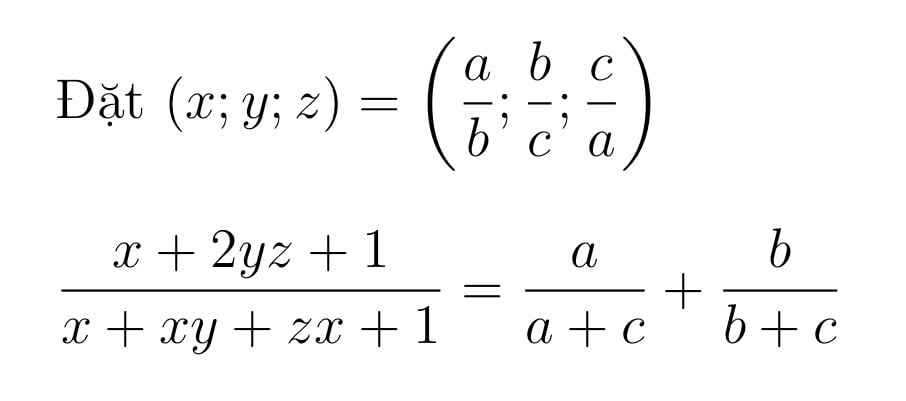Hãy nhập câu hỏi của bạn vào đây, nếu là tài khoản VIP, bạn sẽ được ưu tiên trả lời.

Với a,b,c dưog thì \(\dfrac{x^2}{a}+\dfrac{y^2}{b}+\dfrac{z^2}{c}>=\dfrac{\left(x+y+z\right)^2}{a+b+c}\)
\(P>=\dfrac{\left(x+y+z\right)^2}{xy+yz+xz+\sqrt{1+x^3}+\sqrt{1+y^3}+\sqrt{1+z^3}}\)
\(\sqrt{1+x^3}=\sqrt{\left(1+x\right)\left(1-x+x^2\right)}< =\dfrac{2+x^2}{2}\)
Dấu = xảy ra khi x=2
=>\(P>=\dfrac{\left(x+y+z\right)^2}{2\left(xy+yz+xz\right)+x^2+y^2+z^2+6}=\dfrac{2\left(x+y+z\right)^2}{\left(x+y+z\right)^2+6}\)
Đặt t=(x+y+z)^2(t>=36)
=>P>=2t/t-6
Xét hàm số \(f\left(t\right)=\dfrac{t}{t+6}\left(t>=36\right)\)
\(f'\left(t\right)=\dfrac{6}{\left(t+6\right)^2}>=0,\forall t>=36\)
=>f(t) đồng biến
=>f(t)>=f(36)=6/7
=>P>=12/7
Dấu = xảy ra khi x=y=z=2

Ta có \(x^2+y^2+z^2+2\left(xy+yz+zx\right)=\left(x+y+z\right)^2=4\Rightarrow+xy+yz+zx=-7\)
vì \(x+y+z=2\Rightarrow z-1=1-x-y\Rightarrow\frac{1}{xy+z-1}=\frac{1}{xy+1-x-y}=\frac{1}{\left(x-1\right)\left(y-1\right)}. \)
Suy ra \(S=\frac{1}{\left(x-1\right)\left(y-1\right)}+\frac{1}{\left(y-1\right)\left(z-1\right)}+\frac{1}{\left(z-1\right)\left(x-1\right)}. \)
\(\frac{z-1+x-1+y-1}{\left(x-1\right)\left(y-1\right)\left(z-1\right)}=\frac{x+y+z-3}{xyz-xy-yz-zx+x+y+z-1}=-\frac{1}{7}\)

\(gt\Leftrightarrow\dfrac{1}{\sqrt{x}}+\dfrac{1}{\sqrt{y}}+\dfrac{1}{\sqrt{z}}=1\)
\(P=\dfrac{1}{xyz}\left(x\sqrt{2y^2+yz+2z^2}+y\sqrt{2x^2+xz+2z^2}+z\sqrt{2y^2+xy+2x^2}\right)\)
\(=\dfrac{1}{xyz}\left(x\sqrt{\dfrac{5}{4}\left(y+z\right)^2+\dfrac{3}{4}\left(y-z\right)^2}+y\sqrt{\dfrac{5}{4}\left(x+z\right)^2+\dfrac{3}{4}\left(x-z\right)^2}+z\sqrt{\dfrac{5}{4}\left(x+y\right)^2+\dfrac{3}{4}\left(x-y\right)^2}\right)\)
\(\ge\dfrac{1}{xyz}\left[x.\dfrac{\sqrt{5}\left(z+y\right)}{2}+y.\dfrac{\sqrt{5}\left(x+z\right)}{2}+z.\dfrac{\sqrt{5}\left(x+y\right)}{2}\right]\)
\(=\dfrac{\sqrt{5}\left(z+y\right)}{2yz}+\dfrac{\sqrt{5}\left(x+z\right)}{2xz}+\dfrac{\sqrt{5}\left(x+y\right)}{2xy}\)
\(=\dfrac{\sqrt{5}}{3}\left(1+1+1\right)\left(\dfrac{1}{x}+\dfrac{1}{y}+\dfrac{1}{z}\right)\ge\dfrac{\sqrt{5}}{3}\left(\dfrac{1}{\sqrt{x}}+\dfrac{1}{\sqrt{y}}+\dfrac{1}{\sqrt{z}}\right)^2=\dfrac{\sqrt{5}}{3}\) (bunhia)
Dấu = xảy ra khi \(x=y=z=9\)
Thấy : \(\sqrt{2y^2+yz+2z^2}=\sqrt{\dfrac{5}{4}\left(y+z\right)^2+\dfrac{3}{4}\left(y-z\right)^2}\ge\dfrac{\sqrt{5}}{2}\left(y+z\right)>0\)
CMTT : \(\sqrt{2x^2+xz+2z^2}\ge\dfrac{\sqrt{5}}{2}\left(x+z\right)\) ; \(\sqrt{2y^2+xy+2x^2}\ge\dfrac{\sqrt{5}}{2}\left(x+y\right)\)
Suy ra : \(P\ge\dfrac{1}{xyz}.\dfrac{\sqrt{5}}{2}\left[x\left(y+z\right)+y\left(x+z\right)+z\left(x+y\right)\right]\)
\(\Rightarrow P\ge\sqrt{5}\left(\dfrac{1}{x}+\dfrac{1}{y}+\dfrac{1}{z}\right)\)
Ta có : \(\sqrt{xy}+\sqrt{yz}+\sqrt{xz}=\sqrt{xyz}\Leftrightarrow\dfrac{1}{\sqrt{x}}+\dfrac{1}{\sqrt{y}}+\dfrac{1}{\sqrt{z}}=1\)
Mặt khác : \(\dfrac{1}{x}+\dfrac{1}{y}+\dfrac{1}{z}\ge\dfrac{\left(\dfrac{1}{\sqrt{x}}+\dfrac{1}{\sqrt{y}}+\dfrac{1}{\sqrt{z}}\right)^2}{3}=\dfrac{1}{3}\)
Suy ra : \(P\ge\dfrac{\sqrt{5}}{3}\)
" = " \(\Leftrightarrow x=y=z=9\)

\(\dfrac{x+y}{z}+\dfrac{y+z}{x}+\dfrac{x+z}{y}=\dfrac{x^2y+xy^2+y^2z+yz^2+x^2z+xz^2}{xyz}=\dfrac{-3xyz}{xyz}=-3\)
đề cho xy+yz+xz=0 nhân cả 2 vế với -z
=>-xyz-\(z^2\left(y+x\right)\)=0
=>-xyz=\(z^2x+z^2y\)
cmtt bạn nhân với -y và -z
=>-3xyz=\(x^2y+xy^2+y^2z+yz^2+x^2z+xz^2\)
